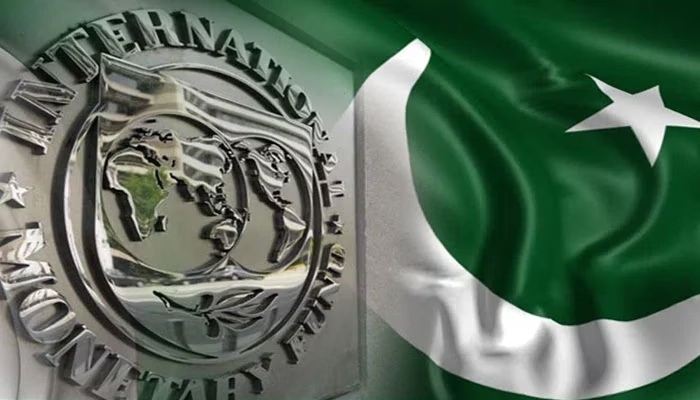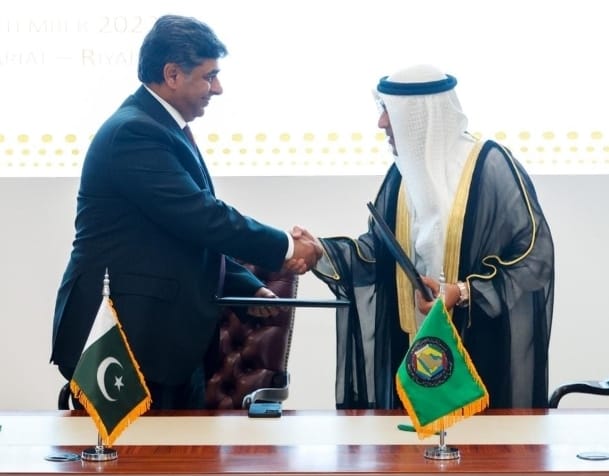Pakistan Caretaker Commerce Minister Gohar Ejaz and GCC Secretary General Jasem Mohamed Albudaiwi inked the joint statement for the Pakistan-GCC FTA….reports Asian Lite News
Pakistan and the Gulf Cooperation Council (GCC) have signed a free trade agreement (FTA) following the conclusion of the final round of negotiations between the two sides in Riyadh, Saudi Arabia, local media reported.
Pakistan Caretaker Commerce Minister Gohar Ejaz and GCC Secretary General Jasem Mohamed Albudaiwi inked the joint statement for the Pakistan-GCC FTA.
“Both parties looked forward to the expeditious signing, ratification, and implementation of the agreement, which will mark a new chapter in the economic relations between our parties,” a joint statement issued by both parties stated, Geo News reported.
The final round was held from September 26-28 at the GCC Headquarters in the Saudi capital.
This is a significant development as the FTA is the first by GCC with any country since 2009 and marks a milestone in both sides’ economic cooperation, Geo News reported.
On the occasion, Ejaz said that Pakistan has excellent relations with all the countries of the GCC and this FTA will ensure that the country’s economic ties are commensurate with these relations.
This will now be followed by an internal administrative and approval process before signing and entry into force of the agreement.

IMF Bailout
The Standby Agreement (SBA) programme by the International Monetary Fund (IMF) with Pakistan came as a lifesaving bailout, rescuing the cash-strapped country from an eminent economic meltdown.
While the strict terms and conditions by the IMF are being complied through difficult decisions by the caretaker government, which has been increasing prices of petroleum products, electricity and gas tariffs every fortnight, directly affecting the levels of inflation in the country and having damaging effects on lives of the locals, the broader intent is streamline domestic and external imbalances through policy anchoring.
The inflation projections during September in Pakistan have been estimated to reach 31 per cent, making the country’s inflation rate the highest in Asia.
This means that the direct effect of inflation through rising electricity and fuel prices in Pakistan, which is being done in compliance with the IMF programme, will further pressure and burden the lives of the masses, who are already suffering to the rising inflation, price hikes, meager or no opportunities for business, joblessness and zero opportunity of earnings.
The government is under serious criticism for not worrying about the miseries of its people, which they say become even more challenging after every 15 days of every month when government announces more increase in prices of fuel, electricity and gas tariffs.
On the other hand, the government maintains that it is bound by the strict requirements of the IMF bailout programme and has no other option but to take unpopular and tough decisions.
IMF maintains that the bailout programme is aimed at giving a temporary cushion for Pakistan to anchor its policies and use the time to formulate a secure financial framework to deal with domestic and external imbalances.
“The programme was approved in 12 July 2023. It is a ninth-month standby arrangement for an amount of $3 billion to support the authority’s Economic Stabilization programme. The objective of the programme is to provide a policy anchor for addressing domestic and external imbalances and a framework for financial support from other donors, and multilateral and bilateral partners, including fresh financing and rollovers of debt coming due,”said Julie Kozak, spokesperson of the IMF.
“All of these reforms are ultimately aimed at paving the way for higher, more inclusive, and more resilient growth,” she added.
The IMF spokesperson’s statement clarifies that the IMF bailout was never intended to provide relief to the masses in Pakistan but was to create pathways to sustained growth for the country in the longer run.

